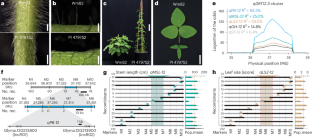2024-04-29 パデュー大学
<関連情報>
- https://www.purdue.edu/newsroom/releases/2024/Q2/gene-seekers-discover-atypical-genes-that-control-multiple-valuable-soybean-traits.html
- https://www.nature.com/articles/s41588-024-01738-2
ダイズにおける複数の改良形質とオオヨコバイ抵抗性の背景にあるロングノンコーディングRNA Long noncoding RNAs underlie multiple domestication traits and leafhopper resistance in soybean
Weidong Wang,Jingbo Duan,Xutong Wang,Xingxing Feng,Liyang Chen,Chancelor B. Clark,Stephen A. Swarm,Jinbin Wang,Sen Lin,Randall L. Nelson,Blake C. Meyers,Xianzhong Feng & Jianxin Ma
Nature Genetics Published:29 April 2024
DOI:https://doi.org/10.1038/s41588-024-01738-2

Abstract
The origin and functionality of long noncoding RNA (lncRNA) remain poorly understood. Here, we show that multiple quantitative trait loci modulating distinct domestication traits in soybeans are pleiotropic effects of a locus composed of two tandem lncRNA genes. These lncRNA genes, each containing two inverted repeats, originating from coding sequences of the MYB genes, function in wild soybeans by generating clusters of small RNA (sRNA) species that inhibit the expression of their MYB gene relatives through post-transcriptional regulation. By contrast, the expression of lncRNA genes in cultivated soybeans is severely repressed, and, consequently, the corresponding MYB genes are highly expressed, shaping multiple distinct domestication traits as well as leafhopper resistance. The inverted repeats were formed before the divergence of the Glycine genus from the Phaseolus–Vigna lineage and exhibit strong structure–function constraints. This study exemplifies a type of target for selection during plant domestication and identifies mechanisms of lncRNA formation and action.


